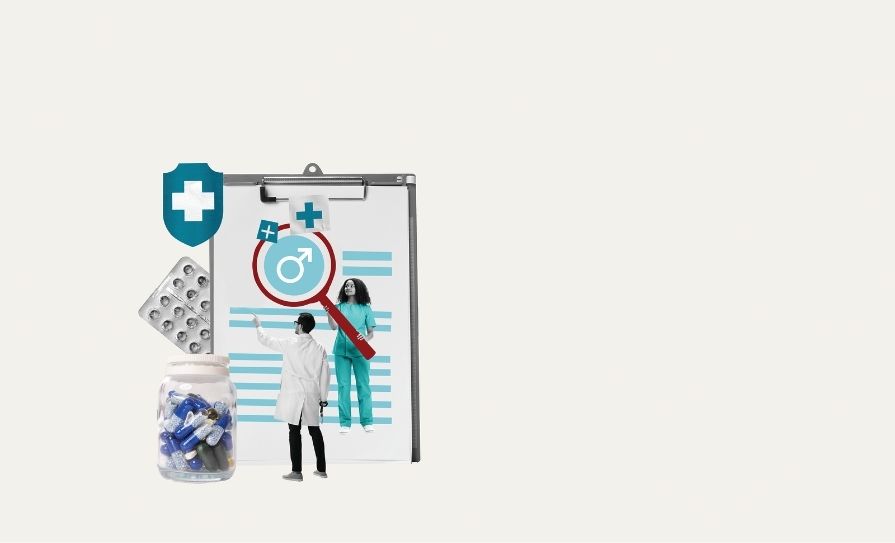Damien O’Brien looks at some of the determinants in men’s health, including the role of the pharmacist in reducing avoidable disease
Introduction
Men’s health remains a significant public health challenge in Ireland. Irish men live, on average, four years less than women and experience higher rates of premature death from cardiovascular disease (CVD), cancer, and suicide. Despite this, men are often less likely to engage with preventive health services or seek timely medical advice. Cultural norms around masculinity, stigma and lower health literacy can act as barriers to healthcare.
Pharmacists, as one of the most accessible healthcare professionals, are ideally positioned to address this gap. They may provide health screening, educate patients on lifestyle interventions, and participate
in health promotion campaigns. Pharmacists can support men to take a proactive role in their health, playing an integral role in reducing avoidable disease and improving health outcomes.
Barriers to healthcare
Research shows that men are less likely than women to access healthcare until illness is advanced. In Ireland, men are less likely to attend GP appointments or participate in screening programmes. Stigma around masculinity can reinforce the perception that seeking help is a sign of weakness, leading many men to delay intervention. Health literacy also plays a role, with men less likely to seek or fully understand health information. Practical barriers, such as work commitments and limited access to primary care, further discourage engagement.
Community pharmacies offer a highly accessible environment for men to engage with healthcare. Pharmacists can provide early interventions such as blood pressure and cholesterol checks, lifestyle advice, and health promotion support. By normalising conversations around health and providing approachable services, pharmacists can help men adopt proactive health behaviours and reduce the risk of preventable disease.
Cardiovascular disease (CVD)
CVD is one of the leading threats to men’s health in Ireland. Men not only develop CVD at younger ages than women but also experience higher mortality from heart disease and stroke. Major risk factors, including hypertension, high cholesterol, smoking, obesity, physical inactivity, and excessive alcohol, remain highly prevalent among Irish men.
CVD encompasses a wide range of conditions that disproportionately affect men. Ischaemic heart disease, including angina and myocardial infarction, is the most common presentation. Stroke occurs more frequently in men and often at younger ages. Peripheral arterial disease may present subtly, for example, as claudication or erectile dysfunction (ED). Heart failure is increasingly observed in older men, frequently following untreated hypertension.
While pharmacological treatments are essential, there is substantial opportunity for early recognition and prevention. Pharmacists can engage in simple measures, such as regular blood pressure checks, cholesterol testing, and lifestyle modification, to delay or prevent the onset of CVD. By introducing cardiovascular screening and counselling into routine pharmacy practice, pharmacists help shift the focus from late-stage disease management to early intervention and prevention, reducing the burden of CVD among Irish men.
Mental health
Mental health is a major challenge for men in Ireland. Men are less likely than women to seek help for psychological distress, yet they experience disproportionately high rates of suicide, depression, and substance misuse. The male suicide rate is approximately four times higher than the female rate, with the greatest burden among men aged 20-34 years.
Depression and anxiety are often underdiagnosed in men, partly because symptoms can present differently
Depression and anxiety are often underdiagnosed in men, partly because symptoms can present differently. Men are more likely to report irritability, anger, or risk-taking behaviour rather than low mood. Alcohol and substance misuse are also closely linked to poor mental health outcomes.
Traditional ideas of masculinity that emphasise self-reliance may discourage men from seeking professional help, compounded by stigma around mental illness. Campaigns such as the HSE’s ‘Connecting for Life’ suicide prevention strategy and local community initiatives aim to encourage open conversation and reduce isolation.
Pharmacists can play a vital role by recognising signs of psychological distress, offering supportive conversation, and referring to GP or mental health services. They are also central to ensuring safe and effective use of pharmacological treatment, while encouraging adherence and addressing stigma around mental health treatment. By promoting early intervention and reducing stigma, pharmacists contribute to closing the mental health gap that disproportionately affects men.
Cancer
Cancer is a leading cause of mortality among men in Ireland, with prostate, colorectal, lung, and testicular cancers accounting for the majority of cancer diagnoses and deaths. Men are less likely to engage in preventive behaviours such as cancer screening, sun protection, smoking cessation,
or seeking medical advice, which contributes to later-stage presentation and poorer outcomes.
Prostate cancer is the most common cancer in men. While many cases are treatable or do not cause serious harm, it remains the second leading cause of cancer death. Routine screening is not offered, but men are encouraged to discuss prostate- specific antigen (PSA) testing with their GP, particularly if they have a family history or are over 50 years old.
Testicular cancer, though rarer, is the most common cancer in men aged 15-34. Outcomes are generally good with early detection, but delayed presentation can result in significant morbidity. Awareness campaigns promoting testicular self-examination and prompt medical review of changes are essential.
Colorectal cancer is another common cancer in Irish men. The HSE Bowel Screen programme offers free screening every two years for men and women aged 59-69. However, uptake remains suboptimal. Pharmacists should encourage participation in the programme, as early detection markedly improves survival.
Lung cancer remains the leading cause of cancer-related death in Irish men. Smoking is the major risk factor for developing lung cancer. Patients should be offered smoking cessation support, which is the single most effective intervention for reducing mortality.
Sexual and reproductive health
Sexual and reproductive health is an important but often overlooked aspect of men’s health in Ireland.
Key issues include ED, sexually transmitted infections (STIs), and contraception. Men are often reluctant to seek support in these areas, with stigma and embarrassment acting
as major barriers. Pharmacists can play a proactive role by normalising discussion, reducing stigma, and providing accessible advice and treatment options.
ED affects a significant proportion of Irish men, with prevalence increasing with age and co-existing conditions such as diabetes, hypertension, and CVD. Beyond its impact on quality of life, ED can also be an early marker of underlying CVD, providing an opportunity for broader health intervention.
Pharmacists are often the first point of contact for men seeking help and can provide safe access to treatment where appropriate or referral to a GP for further assessment. In Ireland, phosphodiesterase 5 (PDE5) inhibitors (sildenafil and tadalafil) are now available without prescription following a structured consultation. This ensures timely access for men while maintaining safety through pharmacist assessment of cardiovascular risk factors, contraindications, and potential drug interactions.
STIs remain an important concern in men’s health. There has been a sharp rise in cases of gonorrhoea, chlamydia, and syphilis, particularly among younger men and men who have sex with men. Stigma, embarrassment, and fear of judgement can deter men from testing or treatment.
Pharmacists can play a role by promoting STI awareness, offering advice on safer sex, and signposting patients to free or confidential testing services. Contraception and responsibility are traditionally viewed as women’s issues, yet men have an important role in shared responsibility. Condom use remains the primary method of male contraception, but uptake is inconsistent. By fostering open conversations around contraception in the pharmacy setting, pharmacists can help normalise male involvement and encourage safer practices, reducing unwanted pregnancy and transmission of STIs.
Lifestyle factors
Lifestyle choices are among the strongest determinants of men’s long- term health, with diet, physical activity, smoking, and alcohol consumption all important factors. Many Irish men are overweight or obese, with a higher prevalence than women. Encouraging balanced nutrition, portion control, and reduced intake of processed foods can significantly reduce the risk of CVD, diabetes, and certain cancers. At least 150 minutes of moderate-intensity exercise per week is the recommended activity level, with many men falling short of this. A sedentary lifestyle is linked to obesity, poor mental health, and increased risk of chronic disease.
Ireland continues to rank among the highest in Europe for alcohol consumption, with men disproportionately affected by binge and harmful drinking. Many Irish men report drinking at levels that pose
Stigma, embarrassment, and fear of judgement can deter men from testing or treatment
health risks, contributing to injuries, liver disease, cancer, and worsening of mental health.
Smoking prevalence has declined in recent years but remains higher in men, particularly in disadvantaged groups. Tobacco use is the single greatest preventable cause of death, linked to cancer, CVD and respiratory illness. Finally, sleep and stress are often overlooked but play an important role in physical and mental health. Men may be less likely to address these issues proactively, despite their impact on health.
The role of the pharmacist
Pharmacists are uniquely positioned within the healthcare system as highly accessible, trusted professionals who often interact with men who may not otherwise engage with health services. They
can deliver timely, preventive health interventions such as blood pressure monitoring, weight management advice, smoking cessation services, and encouragement to participate in screening services. These interventions help reduce men’s disproportionate burden of CVD and cancer.
Pharmacists also play a vital role in supporting mental health and wellbeing. By identifying signs of psychological distress, providing reassurance, and signposting to appropriate services, pharmacists can make valuable interventions in men’s mental health. In the area of sexual health, pharmacists can supply treatment for ED, provide advice on contraception, counsel on STI prevention, and direct patients to specialist services. By addressing sensitive issues without stigma, pharmacists promote openness and early intervention. Pharmacists can offer approachable advice to make a significant contribution to improving health outcomes and life expectancy among men in Ireland.
References available upon request







